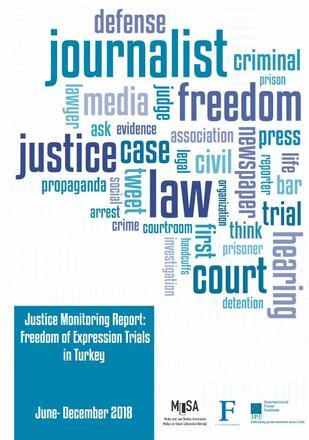
The report provides a snapshot of the Turkish judiciary that has come about after the coup attempt on 15 July 2016. The data provided in the report draws from 90 court sessions in 82 hearings of 71 separate trials, all evaluated on the basis of a standard form prepared by the International Press Institute (IPI) and Media and Law Studies Association’s (MLSA) Legal Unit. This work includes findings from trials monitored as part of the Justice Monitoring Project, supported by the Friedrich Naumann Stiftung (FNST) and conducted by MLSA in collaboration with the International Press Institute (IPI) in Turkey in the second half of 2018.
The defendants in these trials consisted of journalists, lawyers, academics, and politicians. Thirty trained trial observers monitored 90 sessions were held in 10 different provinces of Turkey between 1 June 2018 and 31 December 2018.
In 51% of the legal sessions (46 out of 90) either national or international observers were also present in the courtroom to monitor the hearings.
The report consists in six sections: the executive summary; background and methodology; findings; inside the courtroom; further legal commentary on violations; other activities undertaken in the project. The study highlights most frequent and systematic forms of violation of the right to a fair trial.
The following are among the main findings of the report:
- In 70% of the court sessions observed, defendants were journalists and media workers (78% of all defendants) followed by lawyers (11%); academics (6%), artists (2%), students (2%) and human rights activists (1%).
- 72% of the charges against the defendants (77 out of 107) were terror-related crimes (terrorist propaganda; membership in a terrorist organization; willingly and knowingly aiding and abetting a terrorist organization; founding and/or leading a terrorist organization, committing a crime on behalf of a terrorist organization without being a member).
- The remaining 28% of the court sessions included accusations of: attack on personal rights; attempting to overthrow the constitutional order; denigrating the Turkish nation and/or institutions of Turkey, insulting the president, inciting the public to hatred and animosity and exposing state secrets.
- In most of these cases, the evidence presented against the defendants consisted of their statements, writings, news reports (77%) and social media posts.
- In 49% of these court sessions the defendants were tried whilst in detention.
- In 40% of the court sessions the defendants in pre-trial detention were located in a different province than the one where their proceedings were underway.
- In 34% of the court sessions the defendants in pre-trial detention were not physically present in the courtroom.
- In 36% of the court sessions, the defendants were brought to the sessions in handcuffs.
- In 41% of the sessions panel judges changed at least one time.
- In 70% of cases court sessions started later than planned.
- In 40% of the court sessions, the session was negatively affected by at least one condition such as the small dimension of the courtroom, lack of clarity in the speeches of the judicial panel members: technical errors etc.
- In 56% of cases the panel of judges conducted a private deliberation.
- In 81% of cases the courts where defendants are tried are high criminal courts; 15% are tried in criminal courts of first instances; 2% in civil courts of criminal instances and in 2% in court of appeal.
As for the pre-trial detention periods only 18% of cases account for less than 6 months. In 30% of cases the detention period is between 6 months - 1 year while 52% of defendants stayed in prison for more than 1 year.
The report also provides more elaborate legal explanations regarding the violations observed in these trials concerning unlawful arrest; long detention periods; defendants not being brought to court physically; changes to panel of judges; handcuffs; deliberations taking place in private; trial sessions being open to public; the panel's disrespectful conduct toward the defendants.
The authors stress that the results of the monitoring show that Turkish courts remain below the domestic and international standards set for securing the right to a fair trial, protected under the European Convention on Human Rights (ECHR).
Moreover, these findings indicate that Turkish courts consistently ignore the Constitution and domestic legislation, as well as the international conventions to which Turkey is a party and precedent rulings from international courts.
Full report can be read both in English and in Turkish.
Tags: Turkey Media freedom Freedom of expression European Court of Human RightsThe content of this article can be used according to the terms of Creative Commons: Attribution-NonCommercial 4.0 International (CC BY-NC 4.0) . To do so use the the wording "this article was originally published on the Resource Centre on Media Freedom in Europe" including a direct active link to the original article page.

